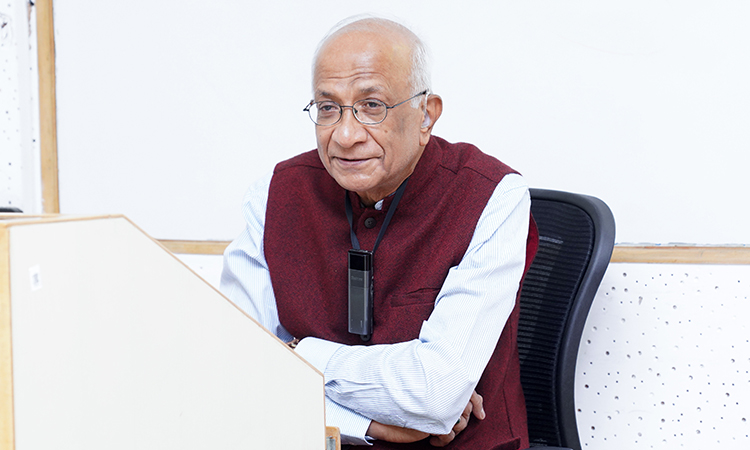Geopolitics and International Trade: Talk by Ambassador Dr. V. S. Seshadri

Centre for Public Policy session examines impact of global power shifts on India's economic security.
22 April 2025, Bengaluru: “Geopolitical contestation and the pursuit of economic security are drilling holes through the international trading system, and the holes are steadily getting bigger,” observed Ambassador Dr. V. S. Seshadri, I.F.S. (Retd.), Senior Fellow for International Trade, during his seminar on ‘Geopolitics and International Trade’ hosted by the Centre for Public Policy (CPP) at IIM Bangalore.
During the session moderated by Professor Gopal Naik, Chaiperson Centre for Public Policy, Dr. Seshadri explored how global trade is being redefined by geopolitics, with the traditional pillars of economic efficiency and comparative advantage increasingly overshadowed by new priorities such as resilience and economic security. He discussed how nations are rethinking their trade dependencies in response to the growing concentration of manufacturing in specific regions and concerns over economic coercion. He also examined the divergence in trade policy approaches among the world's major economic powers China, the European Union, and the United States and highlighted the rising importance of national security considerations in shaping trade decisions. The evolving global trade environment, marked by the increasing influence of geopolitical factors and Trump’s second presidency, further complicates the landscape, especially with tariff-based negotiations and trade imbalances becoming central to international relations.
For India, Dr. Seshadri said, the current environment presents both risks and openings. He urged the need for strategic diversification of trade, regional economic cooperation, and sustained engagement with emerging trade blocs. The lecture encouraged reflection on India's trade preparedness and capacity to adapt to new global alignments that go beyond just economic logic.
Geopolitics and International Trade: Talk by Ambassador Dr. V. S. Seshadri
Centre for Public Policy session examines impact of global power shifts on India's economic security.
22 April 2025, Bengaluru: “Geopolitical contestation and the pursuit of economic security are drilling holes through the international trading system, and the holes are steadily getting bigger,” observed Ambassador Dr. V. S. Seshadri, I.F.S. (Retd.), Senior Fellow for International Trade, during his seminar on ‘Geopolitics and International Trade’ hosted by the Centre for Public Policy (CPP) at IIM Bangalore.
During the session moderated by Professor Gopal Naik, Chaiperson Centre for Public Policy, Dr. Seshadri explored how global trade is being redefined by geopolitics, with the traditional pillars of economic efficiency and comparative advantage increasingly overshadowed by new priorities such as resilience and economic security. He discussed how nations are rethinking their trade dependencies in response to the growing concentration of manufacturing in specific regions and concerns over economic coercion. He also examined the divergence in trade policy approaches among the world's major economic powers China, the European Union, and the United States and highlighted the rising importance of national security considerations in shaping trade decisions. The evolving global trade environment, marked by the increasing influence of geopolitical factors and Trump’s second presidency, further complicates the landscape, especially with tariff-based negotiations and trade imbalances becoming central to international relations.
For India, Dr. Seshadri said, the current environment presents both risks and openings. He urged the need for strategic diversification of trade, regional economic cooperation, and sustained engagement with emerging trade blocs. The lecture encouraged reflection on India's trade preparedness and capacity to adapt to new global alignments that go beyond just economic logic.
